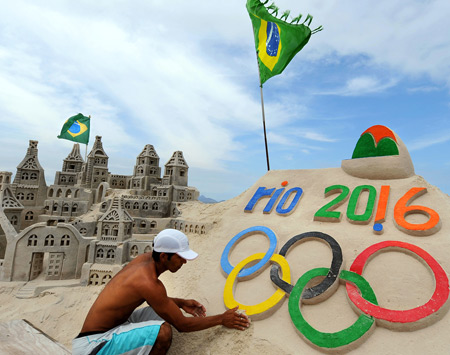
Brazil's crown jewel, Rio, will get the World Cup in 2014 and the Olympics in 2016. Hope the lights work! Source: The Economist
The Economist this week (Nov. 14-20) featured a mediocre special report on Brazil. Its message: Brazil is a good investment. So, you finally noticed! Better to have invested in late 2002, when Brazilian assets were selling at prices implying a sovereign default (which didn’t happen).
Some good points were made though, notably how this is the first global crisis in over thirty years which was not magnified in Brazil. Brazil’s strong external balance sheet (the public sector is a net creditor to the rest of the world), sound macro policy framework, and well-capitalized banks moderated the shocks coming from the U.S. The report featured a nice, though superficial, box on past financial crises in South America’s largest economy.
In an article called “The Self-harming State,” the Economist highlighted how Brazil’s large, cumbersome state gets in the way of the private sector. It’s no joke. Very hard to open a business down there. The report also noted that Brazil will likely grow nicely (4-5% per year) and could become one of the five biggest economies by mid-century. Our poster child of a rising power. Nothing to sneeze at, but China is set to become the number one economy on Planet Earth even earlier, perhaps in the 2020’s. The Economist report, not characterized by analytical depth, does note that what Brazil has over China is its stable democracy, and over India, is relative social peace (despite high crime, there are no ethnic or border conflicts in Brazil).
Yet the article fails to mention one of Brazil’s critical weaknesses: fiscal policy. Most of Brazil’s economic problems in the last half century can be traced to a mismanagement of public finances. Government debt will represent about 70% of GDP this year, which is very high for an emerging market country. Given that most of this debt is borrowed domestically — a good thing in that this limits Brazil’s exposure to currency shocks — the private sector is consequently crowded out of the credit markets, which constrains GDP growth. China and Russia have much, much lower government debt burdens. Further, the Lula administration, which should be praised for its general adherence to sound policies and a market orientation, as well as for its substantive efforts to reduce income inequality, has gotten cocky and reduced its commitment to restraining government spending. The Economist should have told us more about that…
A link to the report follows, as does an excerpt:
http://www.economist.com/specialreports/displayStory.cfm?story_id=14829485
From the Economist:
“BRAZIL has long been known as a place of vast potential. It has the world’s largest freshwater supplies, the largest tropical forests, land so fertile that in some places farmers manage three harvests a year, and huge mineral and hydrocarbon wealth. Foreign investors have staked fortunes on the idea that Brazil is indeed the country of the future. And foreign investors have lost fortunes; most spectacularly, Henry Ford, who made a huge investment in a rubber plantation in the Amazon which he intended to tap for car tyres. Fordlândia, a long-forgotten municipality in the state of Pará, with its faded clapboard houses now slowly being swallowed up by jungle, is perhaps Brazil’s most poignant monument to that repeated triumph of experience over hope.
Foreigners have short memories, but Brazilians have learned to temper their optimism with caution—even now, when the country is enjoying probably its best moment since a group of Portuguese sailors (looking for India) washed up on its shores in 1500. Brazil has been democratic before, it has had economic growth before and it has had low inflation before. But it has never before sustained all three at the same time. If current trends hold (which is a big if), Brazil, with a population of 192m and growing fast, could be one of the world’s five biggest economies by the middle of this century, along with China, America, India and Japan.”